Is this that bizarre North American directive where we're ordered to do something that only makes sense as a personal reflex of spontaneous happiness?
By Mark Fenton
Published June 05, 2012
[T]he truth is I think he was already stuck With Kubla Khan.
He was weeping and wailing: I am finished, finished, I shall never write another word of it, When along comes the Person from Porlock And takes the blame for it.
-- from "Thoughts about the Person from Porlock," by Stevie Smith
TIME: 13:22-16:59
DATE: 05/24/12
LOCATION: Hamilton Public Library, Barton Street Branch
TOPICS DISCUSSED: Brian Wilson, Samuel Taylor Coleridge, John Livingston Lowes, SMiLE, The SMiLE Sessions, Moby Dick, Friedrich August Kekulé, the benzene ring, nerdy tattoos, Gerhard Richter, Limeridge Mall, Butty Towers, SMiLE, Betty, Betty Richter, cool buttons, Kubla Khan, Kublai Khan, Kublai Khan and his recreational property, sex trade workers past and present, Rockwell Kent
I am writing this essay while sitting in the Barton Street library, so far the absolute best place I have found to write without interruption.
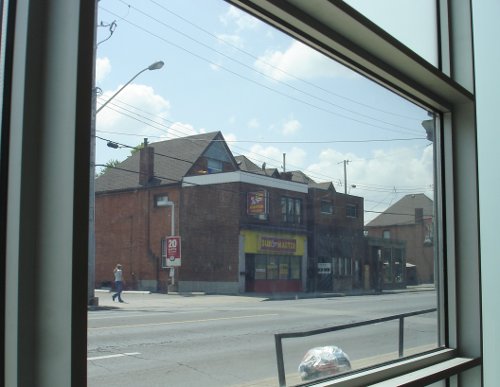
It is a perfect day in late spring. It is hot, but just this side of not too hot. If I lived in a place where surfing was possible, this would be a great day to watch someone surf. But in lieu of a recreation that Hamilton Harbour doesn't offer, I am listening to The *SMiLE Sessions* on my iPod. "Surf's Up" has just started playing.
I am not enjoying it.
My ability to enjoy it was spoiled the moment before I entered the HMV in Limeridge Mall to purchase the album.
There is a general consensus that remarkable achievements should be honoured by remarkable gestures on the part of their consumers. The standing ovation is an example. Standing in those narrow, slanted aisles as the folding chair hits the back of your knees. Pounding your hands until they hurt. The audience exuding that noxious odour unique to the mix of rigorous activity and formalwear.
Maybe you enjoy that. I would rather just drop a 15% tip in a cup and get out of there (I promise you that if you polled the performers they'd take the tip over the applause and the bravos.)
Here's a more personal example. Though I've read it twice, and portions of it countless times, I don't currently own a copy of Moby Dick. This is because it's so easily available that to go out and buy a $15.00 copy doesn't feel commensurate with Melville's labour.
It's not just my effort. I have yet to find an edition whose team of designers and illustrators and printers have done justice to it. The illustration below is from a library copy with woodcuts by Rockwell Kent. They are of a woefully dated 1930s proletarian aesthetic that is both limiting and irrelevant.
I got as far as the scene where Ishmael wakes up in the inn to discover Queequeg - a complete stranger - has been given the same room key, and climbed into bed with him. Rockwell's illustration documents Ishmael waking in terror pinned under the arm of the sleeping Queequeg.
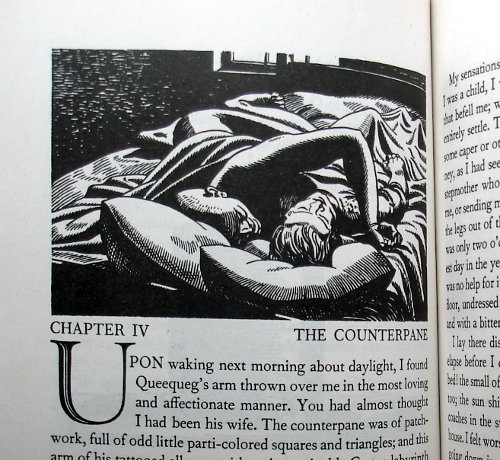
The Illustration does nothing beyond capturing what I can already visualize from the text. I feel as stifled under Queequeg's arm as Ishmael (who at least isn't getting the experience twice.) I tossed the book aside. Until I find an edition worthy of the Most Reverend Moby Richard, the book will not grace my shelf.
How this gets relevant is that I wanted to purchase The SMiLE Sessions, by the Beach Boys in a manner that befit, better still that engaged with, the tortured history of its production in 1966/67, its mind-boggling delays, and its ultimate release in 2011.
If you want the full explanation of why SMiLE took 44 years to be released in an official capacity, refer to the staggeringly detailed Wikipedia on SMiLE, which, as I recall, has about the word count of the Wikipedia on World War I. There are a lot of people out there for whom this album, and, almost equally, its back-story, are very important.
This was where my troubles began. I did not want to be one of the thousands who purchased it on the day, or even the week, or even the month, or even the year of its release. And I most certainly didn't want to order it on line, or to download an MP3 version. Nor did I want to buy it from a specialty store on vinyl. Vinyl, glorious though the sound might be, would be self-consciously antiquated.
No, I wanted to buy it in a generic store in a generic mall in the format of the quotidian. For a man in Hamilton, Ontario at the beginning of the second decade of the 21st century, this meant driving to Limeridge Mall, parking, entering the mall, finding my way to HMV and purchasing it on CD.
It was already spring of 2012 when I chose to do this. Late enough that the release was well out of the music press.
On some level this is a journey to recapture youth. (Even in his youth, can one think of an artist more angst ridden than Mr. Wilson about the loss of it?) In my case I wanted simply to return to my life as a mall rat in the '70s and 80s. Those weeks I'd save up allowance money to buy a record at Mister Sound in Meadowlark Shopping Centre, and then buy candy at the sweet shop, where the gruff owner eyed me eying his frightening and tantalizing adult magazines behind the counter.
But I also wanted to confound associations. I did not want to purchase SMiLE on a day redolent of summer vacation. This is what Beach Boys album covers usually capture, understandably from the content of the music, but by time of Pet Sounds, and SMiLE, Brian Wilson's silver lining had clouded to dark grey, and so I chose a rainy miserable March day on which no one in his or her right mind would think to listen to the Beach Boys.
The road to SMiLE is never a straight course. I'd arranged the trip to HMV so that I would pass Butty Towers on the corner of Mohawk and Upper James,

which apartment complex boasts a baroquely framed SMiLE on its North face.
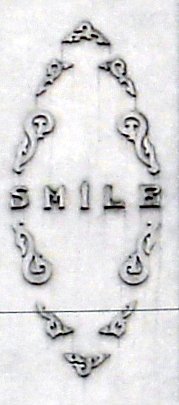
Like the idiosyncratic spelling on the Beach Boys cover, the lavish decoration pushes it from word into icon. Is this "SMiLE!" in the imperative mood; the pronoun 'you', singular or plural, understood? (The isolated lower case 'i' as a misplaced inverted exclamation mark supports this reading for the Beach Boys artwork, as does the 'all caps' typographical bullying of SMiLE on Butty Towers [a building I venture would take a whole other essay to do justice to].)
Is this that bizarre North American directive where we're ordered to do something that only makes sense as a personal reflex of spontaneous happiness? Or does the isolation and decoration of the word make it a SMiLE in and of itself, a pictogram akin to the happy face?
Much of what fascinates us about SMiLE is mythos around that fragile thread called inspiration.
If the lore of inspiration is what excites you, the story of how Samuel Taylor Coleridge came to compose Kubla Khan is legendary. (Though I am skeptical about it having come to him word for word in a hallucination, much as I'm skeptical about Friedrich August Kekulé discovering the shape of the Benzene ring in a dream.)
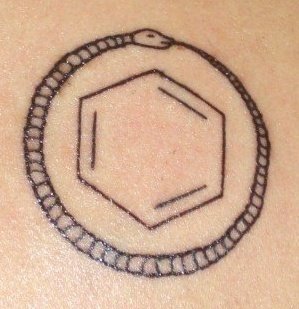
If you thought "nerdy tattoo" was an oxymoron, observe the above from Discover Magazine. Though I think this Tattoo would look wicked on Queequeg (see II above). If I were the inker I'd have done Queegqueg's tattoo with the ouroboros intertwining the benzene ring, the two wrapping right around Queequeg's bicep, not just plunked flat on the flabby, anemic flesh of a lab tech.
This image would fit perfectly with what Melville describes as an "arm ...tattooed all over with an interminable Cretan labyrinth of a figure." At the risk of flogging a dead Rockwell Kent, I am astounded that his illustration of Ishmael's jittery initiation into the multiethnic, homoerotic world of Nantucket harpooners renders Queequeg's arm bereft of a single prick of the tattooist's needle? Mr. Kent renders the arm gleaming pristinely in the moonlight?! When I say that I detest the RK version, I'm referring to idiocy like this. Learn to read, Rockwell. Epic fail.
I'll admit I may just be experiencing envy for people like Coleridge and Kekulé, who have subconscious breakthroughs delivered to them on platters (the more so when the aforementioned genii received said platters by getting messed up on hard drugs or just falling asleep.) I personally spend most of my writing day staying awake and getting rid of the irrelevant junk that leaks in from my subconscious in order to produce something half decent. Yes. I'm a bit bitter.
Of course it's a whole lot more complex than just a flash of inspiration. The truth is that Coleridge educated himself well in poetry and history and philosophy and the drugs he took acted as a neural lightening rod that brought all relevant bits of knowledge - and apparently no irrelevant bits - together into a poem that was utterly original. (I know a whole lot less about organic chemistry but Friedrich August Kekulé's dream didn't come out of nowhere. I'm pretty sure FAK knew his periodic table cold.)
If you want to go further into the specific nature of the information in Coleridge's ROM at the moment it got zapped into RAM, read The Road to Xanadu (1927) by John Livingston Lowes. This book is a scholarly catalogue of literary works that were rattling around in STC's aforementioned and drug altered neural tissue at the time Kubla Khan was written.
It would seem Dr. Lowes came by a comprehensive list of relevant material STC had read. This was long before someone like STC would have a blog, or tweet what he'd been reading, so JLL really did his homework. The Road to Xanadu belongs to that old-school, ultimately tedious ilk of literary scholarship where the author relates a great work of art of its sources, one after the other.
I owned a copy decades ago and lost it and haven't missed it, but it must have been a real impressive thing in 1927. If it hasn't already been done, someone will write an app that runs through the internet and discovers the sources for any great poem in 20 seconds.
Anyway, Coleridge had all this deep and elevated information about Kublai Khan in his brain, and his personal method of procrastination (and I think all of us who write will agree that procrastination is, as a prelude to composition, what hand wrapping and gloving-up are to boxing) was to do a hit of laudanum (my understanding of which is a heavy duty opiate in an herbal/alcoholic base and in 1797 you could get this stuff without a prescription.)
This kind of writer's prep is way out of my safe zone. Whatever addled structure you lament in this essay, it is the result of a dead sober and drug free consciousness housed temporarily in the Barton Street Library. I have no idea whether laudanum is tasty or just something you chug for the high, but whatever the case, sometime in October of 1797, STC does some.
While the average stoner on a similar high would just throw on a Grateful Dead album and stare at his shoe, STC, after a hallucination of unknown duration, is inspired to write a near perfect first draft describing a recreational real estate project developed by the 13th Century Mongolian Emperor, Kublai Khan. Line after line emerges fully formed, and it will become an enduring classic.
Poetry writing is seldom thought of as a spectator sport, but this one you'd want to buy tickets to (as did the PFP, see XI below). If bouts between poets and the bare screaming whiteness of the page were prize fights, this would be the Forman/Ali fight. Coleridge kills Kubla Khan. At least that's how it looks in the first few rounds.
Until - like an unanticipated hook to the glass jaw we'd almost forgotten STC is famous for - the page retaliates in the guise of a knock on the door. Everything goes black. The walls and towers of Xanadu come crashing down.
I've been scribbling notes in the Barton Street Library for a few hours now. In the time I've been here, two people have seated themselves across from me and read the paper. Now they're gone and a young woman, about my daughter's age I'd guess - I haven't seen her face and likely won't - sits at a table across the room nursing her baby.

At about this point I wonder if I could pitch out all the stuff I'd written so far about Brian Wilson and Samuel Taylor Coleridge, and compose an entire photo essay on things I experience without moving from my seat in the Barton Public Library. Such are the prosaic and misguided ideas that come to writers under the influence of nothing stronger than coffee.
The man who brought Coleridge down is known to history as the Person from Porlock. As soon as I Googled "person fr-" the PFP had appeared as a fully formed digital option. (Double the characters it takes to get Lee Harvey Oswald. But still.) The PFP is history's most distinguished assassin of artistic creation. A knock on the door. The vaguely defined Person from Porlock is there. Kills the moment. The poem is finished. A mere fragment. Kubla Khan, banished from the epic that might have been and left to wander the measureless caverns of literary history.
I'm sometimes concerned that so little of what I write comes from my own observations, and that so much of it comes from what other people have made. But I'm not sure it's so different for anyone, since civilization is about consuming the vast surplus of what those before us have left.
All the medieval literature Coleridge had read, the work of fellow poets, the rules of verse; all the songs Brian Wilson had heard, all the rules of orchestration and harmony he'd absorbed. At a certain point it's impossible to tell what is our empirical scrap heap and what is someone else's.
Thus the image of the young woman whose face I will never see immediately summons up "Betty" (1988) Gerhard Richter's painting of a young woman whose face I will never see.
Richter's "Betty" is a portrait of his daughter. Betty is looking at an existing painting. In a sense consuming it. It's a monochrome canvas covered in glass, one that her father had created a decade earlier, from a series of artworks designed specifically to reflect the image of the viewer viewing it.
So Betty, the subject of the painting, is looking at her own face, but the viewer of the painting, can't see the subject's face (in other words the situation is the opposite of a conventional portrait.) The artist, as he paints, experiencing his daughter experiencing his own work, which is also his daughter experiencing herself.

Like "Kubla Khan," SMiLE is a grand vision interrupted, irrevocably. In Brian Wilson's case the work took 44 years to finally impose a form upon. And it still feels like a fragment. A thing that defies completion. I imagine that once, in the wisps of Brian Wilson's consciousness, there was a coherent if ephemeral idea of the whole. As frightening and tantalizing as forbidden magazines behind the counter of a sweet shop. With as perfect symmetry and proportion as "the stately pleasure dome" Kubla decrees in Coleridge's poem.
Or perhaps, as Thomas Pynchon describes Kekulé dream, a "Great Serpent holding its own tail in its mouth, the dreaming Serpent which surrounds the World." (Gravity's Rainbow, Viking, p. 412)
There are far too many speculations about Brian Wilson's PFP to list. I suspect he was disturbed by not one but many PFPs.
I am sitting in the Barton Public Library, but mentally I am back in the hour of my SMiLE purchase.
I park between Limeridge Mall and Fortinos,

With the wind behind me I run to the mall.

I move through it quickly. Shooting my camera at intervals. You never know where the story might be going. I stand before HMV and steal my last microsecond from eternity.

I am accosted. I have been followed. This "person"-there's no other word for her-says she has noticed that I am taking photos. So far so good. So far I have not heard either a question or an interdiction. She then says, as a kind of tentative jab a few seconds into the round, "I am going to ask you not to take pictures."
I pause to consider this statement, which could be described as a request contained in an envelope that has not yet come through my mail slot. If she tells me she's going to ask me not to take pictures, is this not an advisory of a request that is still pending? Syntactically that's what this seems to be.
But the silence that follows her two-tiered statement suggests that the statement warning me of the impending request doubles as the request itself. Her stolid body language supports this reading. I sense I am meant to retaliate. She is spoiling for a fight.
I'd prefer to squeeze through the loophole she's dangling before me. To say, "Are you telling me that at some time in the future, a future perhaps near, perhaps distant, a future as yet unknown to me, as yet, for all I know, unknown even to you, but as decisive and defining as a snapshot, are you telling me that at such a moment you are going to ask me to no longer take photos, and, by logical extension, are you telling me that until that time I am free to continue shooting photos willy nilly? Am I to gather that you are giving me nothing more than a generous forecast of a future restriction?"
This is what I want to say. But of course I don't. I simply nod politely, put my camera away, proceeded into HMV and purchase The SMiLE Sessions.
I wonder if the Person from Porlock addressed STC in a similar manner.
STC: (opening the door as he rubs his eyes and, with a silk handkerchief, wipes away some drool that's collected at the corner of his mouth.) Yes. Can I help you?
PFP: Good evening guv'nur. From Porlock, I am.
STC: Er...how singular.
PFP: Just passing by, right. Saw you in the window and couldn't 'elp but notice you were at writin' something down. Thinking to meself, I'll bet that's an author at work.
STC: Yes...I'm a poet actually.
PFP: Would I of 'eard of you?
STC: I shouldn't think so. No.
PFP: Right then. Well, I'm going to 'ave to ask you to stop writin' then.
STC: I beg your pardon?
PFP: Nah, just kidding. I'll be on my way. Not every day one gets to meeting a literary gentleman.
And as mysteriously as he'd arrived the PFP is gone.
That's just my version. Not even John Livingston Lowes knows the identity of the PFP or what his business was. Am I the only reader intrigued by the fact that the PFP is non-gender specific? Sure, Coleridge is a poet and probably liked the 'p' alliteration, but it seems puzzling not to refer to a man from Porlock, or a gentleman from Porlock.
What if it was in fact a woman from Porlock, and he left it deliberately vague so we'd assume it was a man on respectable business. If I'm correct in this hypothesis, exactly what kind of woman in 1797, from a neighbouring town no less, knocks randomly at a man's door?
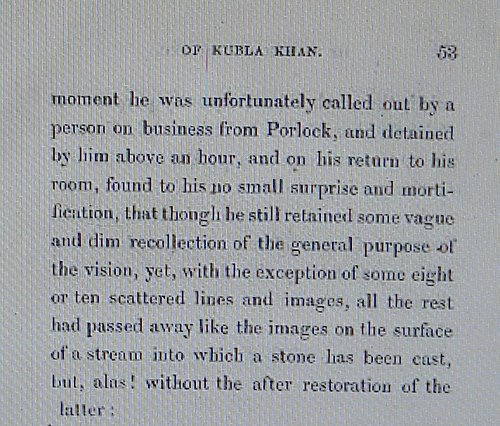
Business indeed! No doubt this is her payment for STC continuing to supply her with laudanum. (It's so sordid I feel almost dirty writing these words in the wholesome oasis of the Barton Street Library.) Probably lasted a good hour or two. No kidding Coleridge had lost the plot by the time he returned to his desk! Interesting that he writes about his experience in the third person? Evading much?
Whatever the story, the reality is that Coleridge can't get back into the poem. While I'd never compare my photo essays to the work of Coleridge I was really furious at the Person From Limeridge. Because during the journey to the mall I'd formulated not just the broad strokes of an essay, but actual sentences and paragraphs. It was essentially done. It just had to be written up. I was thrilled, I'd buy my album and go home and write it as The SMiLE Sessions blared away on the stereo.
Now it was all blasted to nothing. I couldn't remember a thing I'd intended to say about SMiLE or Limeridge, or anything about the journey. (So this isn't the essay you were supposed to get. I'm making up completely new stuff and scribbling it so angrily here in the Barton Street Library that the ballpoint is going right through the paper.)
Maybe that's what happened to Brian. All this stuff on pieces of magnetic tape ready to be spliced together and then some idiot wanders into the studio and blasts away his whole conception of it and what the hell is he supposed to do but fall apart. Therapists assembling around his bed like a Greek chorus.
I got home and unpacked my purchase. It's one of those deluxe editions where they give you a lot of stuff to take in and out of the box and amuse yourself with. There's even a SMiLE button
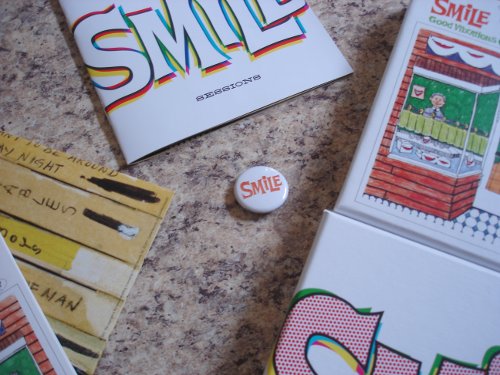
which I so far haven't found a sartorial application for. (Love to see it on Coleridge

or better still, tattooed onto Queequeg's arm.) The button rattles around in the box when I take it off the shelf and it just exaggerates the hollowness of my SMiLE Sessions experience.
Still, there was nothing to do but slide it into the CD player, and it made its noise and I stared out at the day and wished it was sunny.
I'm into my third hour at the Barton Street Library and The SMiLE Sessions is on its third loop and I'm beginning to like it a bit better. But there's is no escaping the desperation of this music to recapture an ideal that was tenuous even decades earlier. Like a man sobbing over a woman who may not have loved him even when she was there.
I resolved that I would not even try to recover the lost thoughts that the PFL had stolen. I would start from scratch at the Barton Street Library. I looked up. I hadn't heard her leave but the young woman with the baby was gone. I was staring at nothing. Not even my own nothing, the nothing the woman with the baby had consumed for herself. It wasn't my experience, it was hers.

I looked down again. The pages of my notebook have seldom looked blanker.
Assuming the PFP was neither a laudanum whore, nor Coleridge's doctor (as has been posited by scholars [for 'Dr.' read 'dealer'. A few mumbled monosyllables. A crumpled paper bag in a sweaty hand, swapped for a few crumpled pounds in a sweaty hand.]) but was there for legitimate business there is, I suppose, something to be said for living in an age where business is so easily conducted by phone.
It can always go to voice mail if one is in the middle of an inspirational run. Better still is e-mail. "I'll get to it when I'm all finished this piece and then check to see if Wordsworth and Byron have updated their Facebook status." I'm a bit out of touch with contemporary poetry, but I can only assume poems are more polished and complete now that we've largely done away with those annoying knocks on the door required for every single bit of business communication.
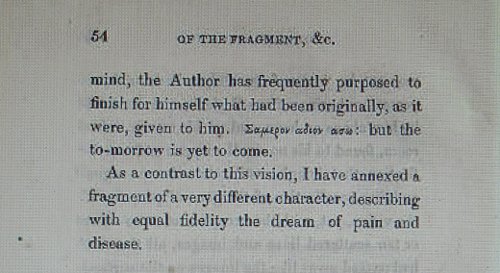
[You've guessed that these excerpts from Coleridge's introduction were not obtained at the Barton Street Library. It looks to be uploaded from a 19th Century edition on a website I can't now find. I realize I'm only telling you what I don't know, and thus this citation may qualify as the most irresponsible and unjust use of a source in publishing history. Have fun with the Greek.]
Brian Wilson, on different but similarly miraculous drugs, conceived SMiLE fairly quickly, and had all gone well would have released it in 1967 with a tracking sequence something like this.
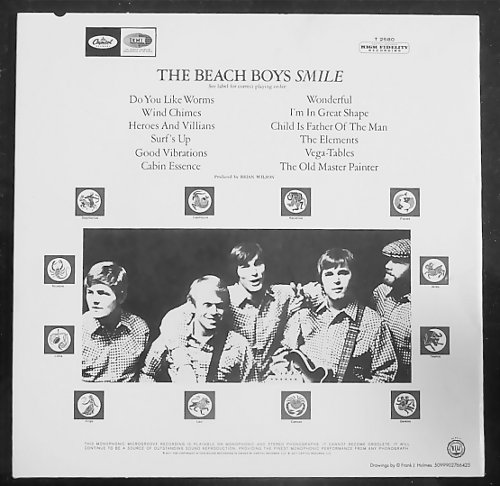
It didn't gel. Something got lost between conception and birth. But he chose to withhold what he'd already managed to set down until, to quote Coleridge, he "finished for himself what had been originally, as it were, given to him." It took 44 years. By his admission and the general consensus of Brian Wilson trekkies, it is not, and will never be a finished SMiLE, but only The SMiLE Sessions (i.e. fragments of a lost vision).
Thankfully Coleridge waited a mere 19 years before publishing "Kubla Khan." It would have been a lot messier if a 44 year delay had been imposed on it. Coleridge would be dead, and the pages, including probably hundreds of worksheets would have been put out at a yard sale by the estate, along with his old shoes and gardening tools.
Discovered in the late 20th century, claims would be made for it on dubious websites, the pages eventually showing up at Sotheby's and verified as real by experts. Finally the poem would appear in a lavish, slip-covered edition entitled The Kubla [sic] Khan Fragments beautifully edited and annotated by an army of scholars. Two pages of poetry. Two hundred pages of outtakes.
That thing rattling around in the Amazon.com box when The Kulba [sic] Khan Fragments(deluxe limited edition) lands on your doorstep is the cool Kubla Khan button.
I closed my notebook and put away my iPod. The SMiLE Sessions had been done for ages and my ears were plugged into silence. The young woman with the baby hadn't come back and wasn't going to. (Like the "Abyssinian maid" in "Kubla Khan," who's song the poet needs in order to regain his inspiration. But she's gone forever.)
I walked down Barton Street getting mildly sunburned. A sex trade worker approached a car at a stop light and I made a bet with myself that she wouldn't get in the car. (I won the bet). Two doors past the intersection I could still smell her perfume. Cars visibly moved to the edge of their lane when they passed a parked Hummer

which they didn't do for anything else that was parked.
I turned North at Mary and crossed the bridge over the railroad tracks that I'd never crossed before but always wanted to.

When I got home my eldest daughter was in the back yard working on her university application. She'd looked up from the pages on the table and was turned away from me. She was looking at something but I couldn't see what it was.
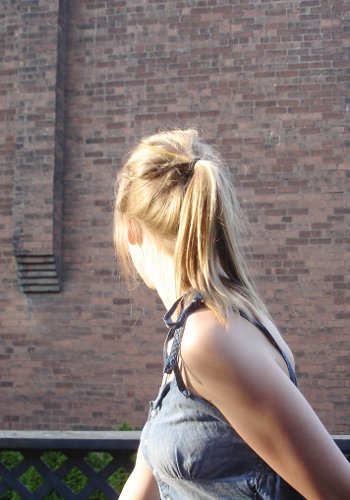
By Writeorama (anonymous) | Posted June 06, 2012 at 00:54:10
Man oh mano. Brilliant!
By shelley swanway (anonymous) | Posted June 12, 2012 at 00:12:41
Give last derived is what this tablet made out of vive la derive.
Very engaging psychogeoraphical method of composition
Wrt making texts from observation plus reports, Bateson said that what is sought is the maximum familiarity with the maximum novelty.
Don't know why some coincidences seem eerie ie unnatural.this experience doesn't appear much in literature, probably because it feels like plot but one which is beyond us. These passages are the glassy moments of life that is,the usual order of events lapses,things get bunchy, in the way that glasses have different orders of crystallization, because they cool too quickly for uniformity of structure to occur. Life is similarly a liquid that appears solid.
Officious persons prohibiting photos at the mall...perhaps people use the place for wedding photos. You might be heartened by the work of Trevor Paglen,who used astronomical gear to make images of um remote military bases. He is avenging you real good.
Great piece. Carry on surveillance.
By Gregor Samsa (anonymous) | Posted June 21, 2012 at 23:32:35
I'm not in the mood to say much Mark but that I enjoyed your essay. Great tie-in between
the Beach Boys and Coleridge. I've always found something unfinished in both of them, especially The Great Khan and Smile. I actually had a friend years ago who seemed to be waiting his whole life for Brian Wilson to re-issue Smile complete. I'm sure when he was 50 and it actually did show up at the HMV in Hamilton he must have been happier than a pig in shit. But maybe disappointed too, as isn't the waiting more of a religious expectation than the actual arrival of the thing? I liked the photo of your oldest daughter at the end, though for some reason it feels a little self-conscious? Though maybe she was eyeing something the cat was playing with or the sound of a horn across the street..who knows? But maybe that's just me...and who could be more self conscious than a man staring at a fly on his ceiling for Christ's sake!?
You must be logged in to comment.
There are no upcoming events right now.
Why not post one?